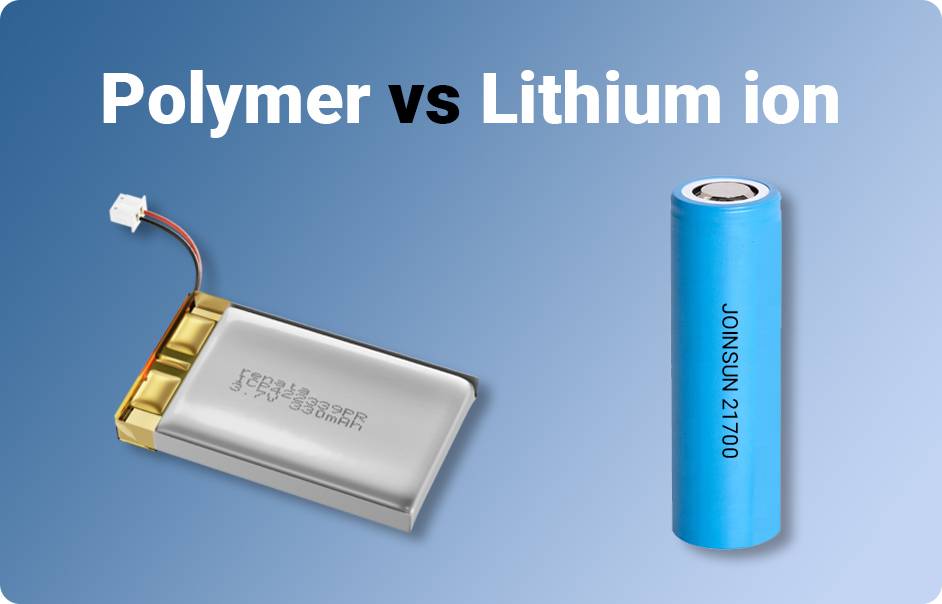When it comes to rechargeable batteries, two types come up frequently: lithium-ion (Li-ion) and lithium polymer (LiPo). Both are widely used in many devices like smartphones, laptops, and electric vehicles, but there are some key differences. In this article, we’ll look at the difference between lithium ion and lithium polymer batteries and help you figure out which one is better for your needs.
1. What are they made of?
Both lithium-ion and LiPo batteries use lithium-based technology, but their composition is different.
Lithium-ion (Li-ion): These batteries contain a liquid electrolyte (a solution of lithium salts) that helps move lithium ions between the positive and negative parts of the battery during charging and discharging. Lithium-ion batteries are usually housed in rigid, cylindrical, or rectangular cases.
Lithium Polymer (LiPo): LiPo batteries use a gel-like polymer electrolyte instead of a liquid. This allows them to be lighter and more flexible. They come in soft pouches, which makes them more convenient to carry in a variety of shapes and sizes.
2. Energy Storage and Performance
The amount of energy a battery can hold about its size and weight is very important. This is called energy density.
Lithium-ion (Li-ion): Li-ion batteries generally have a high energy density, which means they can store more energy in a small space. This makes them ideal for devices like smartphones, laptops, and electric cars, where space and weight are limited, but a large battery is needed.
Lithium Polymer (Li-Ion): Li-ion batteries don’t store as much energy as Li-ion batteries, but they still perform well. They are commonly found in devices where weight and size are important, such as drones and RC cars, where a lighter, smaller battery is needed.
3. Weight and Flexibility
When you need a battery to fit into a specific design or to keep weight down, the type of battery is important.
Lithium-ion (Li-ion): These batteries are heavier and more rigid due to their solid casing. This makes them less flexible when it comes to fitting into compact spaces.
Lithium Polymer (LiPo): LiPo batteries are lighter and more flexible, making them easier to fit into small or awkward spaces. This flexibility makes them great for devices like drones and thin smartphones, where weight and shape are important.
4. Safety and Stability
Both types of batteries come with safety features, but they behave differently when they are under stress.
Lithium-ion (Li-ion): Li-ion batteries are generally safe and have been used in many devices for years. However, they can become unstable if overcharged or damaged. The hard casing makes them less able to absorb shock, so physical damage can be a concern.
Lithium Polymer (LiPo): LiPo batteries are more prone to swelling (when they are charged or discharged too quickly) and can catch fire if punctured. However, their soft pouch design means they can handle some physical stresses better than Li-ion batteries. However, care is still required to avoid damage and overheating.
5. Charging and discharging speed
How quickly a battery charges or discharges can affect its performance in certain devices.
Lithium-ion (Li-ion): Li-ion batteries charge and discharge more slowly than LiPo batteries. This makes them good for everyday devices that don’t need fast power.
Lithium polymer (LiPo): LiPo batteries are known for their ability to charge and discharge quickly. This makes them ideal for high-performance devices like drones or RC cars, where fast power usage is required.
6. Price
Price is always an important factor when choosing a battery.
Lithium-ion (Li-ion): Li-ion batteries are generally cheaper than LiPo batteries. They are mass-produced and have an established track record, making them more affordable for most consumer electronics.
Lithium polymer (LiPo): LiPo batteries are more expensive because they are more complex to manufacture. However, the extra cost may be worth it for devices that need their specific benefits, such as flexibility and fast power.
7. Which one should you choose?
So, which battery is best for you? It depends on what you need it for.
Choose Li-ion if:
You need a reliable, long-lasting battery for devices like smartphones laptops, or electric cars, where energy storage and cost are more important than size and flexibility. Li-ion is a strong, affordable option for everyday use.
Choose LiPo if:
You need a lightweight, flexible, and high-performance battery for devices like drones, RC cars, or wearables. If you’re more concerned with fast charging, lightweight, and compact design, LiPo may be the right choice.
Why Magnificette Is The Best Solution for Electronic Components
Magnificette is a well-known marketplace for electronic components. We hand-pick our products including cables and wires, resistors, power supplies, modules, semiconductors, integrated circuits (ICs), and more. Everything is designed with cutting-edge technology and meets the latest industry standards, ensuring high quality for our customers.
Conclusion
In conclusion, both lithium-ion (Li-ion) and lithium polymer (LiPo) batteries have their strengths. Lithium-ion batteries are known for their high energy storage and low cost, making them ideal for everyday devices. On the other hand, LiPo batteries are lighter, more flexible, and can handle rapid power bursts, making them better for performance-focused devices. Understanding the strengths of each can help you decide which battery best suits your needs.








Leave a Reply